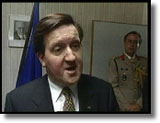
|
Hopes Rise for EurofighterDefence Secretary George Robertson has been reassured by the German government that it does want to go ahead with the Eurofighter, despite having to cut spending.Tens of thousands of British jobs depend on the project and the Government has become alarmed at continued delays by Germany in approving its share of funding for production of the multi-national aircraft. The problem has been made worse by Germany's need to reduce its budget deficit in order to meet the Maastricht conditions on the Single European Currency. Mr Robertson had what were described as "encouraging" talks with German Defence Minister Volker Ruehe, who once tried to kill the project off. Mr Robertson said that Mr Ruehe was now personally committed to the Eurofighter and was working hard to make sure the money was available. Mr Ruehe said that for strategic, military, political and European reasons, the Eurofighter should be produced. He said that the outlook was "better than 50-50" and revealed that the German government hoped to make a final decision at its cabinet meeting on July 11. In the Commons, the Prime Minister stressed that the Eurofighter project was important for British defence and jobs and that he would press German Chancellor Helmut Kohl to proceed with it when they met on Friday. "We will be doing everything we can to see the project out," he told MPs during Prime Minister's Questions. German ProblemsFinance Minister Theo Waigel accepts the need to replace Germany's ageing Phantom fighters, but is concerned about costs in the struggle to meet the criteria for economic and monetary union amid rising unemployment and plans to cut taxes.
Postponement would also hit export hopes at a time when both the United Arab Emirates and Norway have shortlisted the Eurofighter for their next generation combat jet. Germany's share of production investment is little more than £1 billion over the next four years. At peak production, Eurofighter will provide between 250,000 and 300,000 jobs across Europe both directly and indirectly. Britain, Italy and Spain could decide to press on without Germany but the extra costs could prove prohibitive. A decision to scrap the project would signal a total surrender to the might of the United States' aerospace industry and leave Britain and its partners with no option but to buy American fighter aircraft. |
Diana, Princess of Wales, 1961-1997
Conference 97
Devolution
The Archive
News |
Issues |
Background |
Parties |
Analysis |
TV/Radio/Web
Interactive |
Forum |
Live |
About This Site
News |
Issues |
Background |
Parties |
Analysis |
TV/Radio/Web
Interactive |
Forum |
Live |
About This Site
© BBC 1997 |
politics97@bbc.co.uk |

